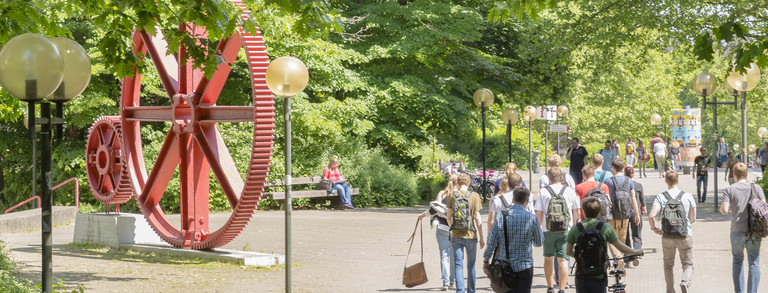The Dortmund Model: Music
Project management: Prof. Dr. Irmgard Merkt
Funding: Ministry of Labour, Integration and Social Affairs NRW
Project duration: 2010 - 2013
The "Dortmund Model: Music" created inclusive music culture. People with disabilities received instrumental lessons, took part in compact phases and workshops, became members of various ensembles and performed publicly in concerts. Broad-based education, talent promotion and professionalisation were the central concerns of DOMO:MUSIK.
The project was carried out by the Department of Music Education and Music Therapy in Rehabilitation and Pedagogy with Disabilities of the Faculty of Rehabilitation Science at the TU Dortmund University.
Cultural work and people with disabilities
The project, together with the parallel application for an art and graphics studio from AWO Dortmund to Stiftung Wohlfahrtspflege NRW, was part of the overall project "Dortmund Model - Cultural Work and People with Disabilities".
The project also aimed for continuity and sustainability in its music-related aspects. The focus was initially on three areas:
- Everyday life and the competences and resources of people with disabilities: people with disabilities find and develop new aspects of shaping their lives as well as (perhaps unrecognised) aspects of their personality throughout their life span through artistic and musical activity. At the same time, new and independent positions open up for them in working life and in the cultural sector.
- Cultural participation of people with disabilities: Active cultural participation in the sense of production subsequently means public participation in cultural life. Musical and cultural life as a whole gains new artistic and social impulses through cooperation between people with and without disabilities.
- The political goal of integration and inclusion: The prerequisite for a social change towards integration and inclusion of people with disabilities is encounter. Public places of encounter and production allow a new view of people with disabilities and enable a gradual reduction of fears, insecurity and prejudices.
Project description Music
- The broad promotion phase: In courses of elementary music education, work was done with people with disabilities to arouse interest in different styles of music and to develop adequate forms of music making with the voice and on different instruments that are appropriate to their abilities. This phase lasted from April 2010 to March 2011.
- Talent development phase: From the courses and workshops, participants who had special musical abilities were grouped into talent courses. In these talent courses, several hours of work were done per week to train the participants' musical and instrumental expression. This phase lasted from April 2011 to March 2012.
- Continuation of the musical work: Regular offers of special training phases (workshop phases) for the people with disabilities already involved served the creative further development. At the same time, the new beginning of the broad promotion phase took place. The aim was to bring the music processes and music productions into the public consciousness and to advance their marketing to such an extent that the musicians could earn an ever greater share of their income themselves. This phase lasted from April 2012 to March 2013.
More information can be found on the Homepage of Musik inklusiv.

